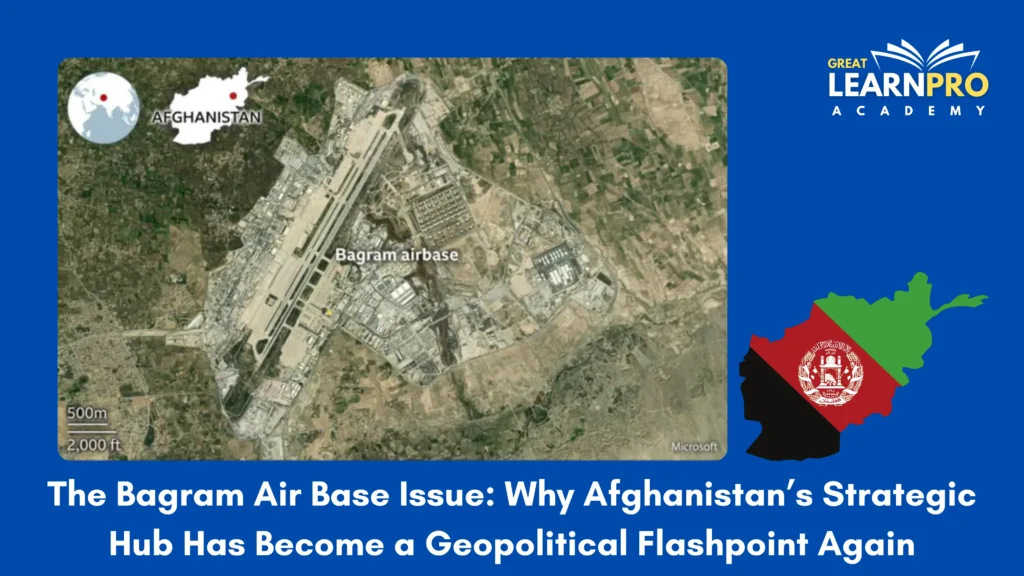Bagram Air Base, located in Parwan Province about 50 kilometers north of Kabul, has long been one of the most strategically important military installations in Afghanistan. Originally constructed by the Soviet Union during the Cold War, the base later became the central hub for U.S. and NATO operations following the 2001 invasion of Afghanistan. Over two decades, it served as the heart of military logistics, air support, intelligence coordination, and detention operations. Today, the base is once again at the center of global attention, as the debate over its control resurfaces in the evolving geopolitical landscape of South and Central Asia.

The 2021 Withdrawal and Its Consequences
In July 2021, the United States formally vacated Bagram Air Base, transferring control to Afghan forces as part of its final military withdrawal from the country. The handover was marked by controversy. Reports indicated that the U.S. forces left the base abruptly, cutting electricity and vacating the premises without prior notice to Afghan commanders. The sudden departure led to chaos and looting, symbolizing the hasty nature of the overall withdrawal. Within weeks, as the Taliban advanced across Afghanistan, Bagram fell under their control along with other key military installations. The Taliban’s capture of Bagram signified both the symbolic and operational end of America’s two-decade military presence in Afghanistan.
The Renewed Dispute Over Bagram
The issue has resurfaced in recent months as calls have emerged within sections of the U.S. political establishment—particularly from former President Donald Trump to regain control of the Bagram Air Base. Trump has described the withdrawal from Bagram as a strategic blunder, emphasizing its importance due to the base’s proximity to China and its potential use as a counterterrorism and surveillance platform in the region. He has suggested that reclaiming Bagram could help the U.S. reassert influence in Central Asia and monitor emerging security threats.
However, these statements have sparked strong reactions from the Taliban government, which now controls Afghanistan. The Taliban leadership has categorically rejected any suggestion that the U.S. or any foreign power could regain control of Bagram. They have reiterated that Afghanistan’s sovereignty is non-negotiable and that no portion of Afghan soil will be ceded to another nation. For the Taliban, retaining control over Bagram is not merely a military matter—it is a symbol of their political legitimacy and a reaffirmation of Afghanistan’s independence after decades of foreign intervention.
Strategic Significance and Geopolitical Dimensions
Bagram Air Base remains a highly valuable asset due to its location and infrastructure. Its proximity to countries like China, Iran, and Pakistan places it at the crossroads of multiple regional power dynamics. For the U.S., regaining access to Bagram would restore a critical foothold in a region where its influence has waned since the withdrawal. It would offer strategic reach for intelligence gathering, counterterrorism operations, and as a monitoring post in relation to China’s growing presence in Central Asia.
For the Taliban, however, Bagram represents control over a symbol of sovereignty. Allowing the U.S. to return would undermine the political narrative they have built since 2021 that Afghanistan is no longer under foreign domination. Moreover, such a move could trigger internal dissent and opposition among hardline factions within the Taliban, many of whom fought specifically to end foreign occupation.
Neighboring powers also view the issue through their own strategic lenses. China and Russia have expressed concerns about any renewed American military presence near their spheres of influence. Pakistan, too, would be wary of how such a move might affect regional security balances. Thus, the question of Bagram extends far beyond Afghan borders; it is a test of shifting global alignments in a multipolar world.
Legal and Diplomatic Complexities
Beyond geopolitics, the issue raises legal and diplomatic questions. The Taliban government argues that any U.S. attempt to regain control would violate Afghanistan’s sovereignty and contradict previous international commitments made under the Doha Agreement, which formally ended hostilities between the two sides. The agreement emphasized non-interference and respect for Afghanistan’s territorial integrity.
From a legal standpoint, the Taliban’s position finds some support in international law, which prioritizes national sovereignty and prohibits foreign occupation without consent. For the U.S., however, the challenge lies not only in securing legal grounds but also in finding a diplomatic pathway that does not legitimize the Taliban regime a government that Washington has not formally recognized. Any potential negotiation over Bagram would therefore carry immense political and diplomatic implications.
Security and Operational Challenges
Even if the U.S. were to pursue a return to Bagram, practical challenges abound. Re-establishing operational control would require significant troop deployment, logistical support, and infrastructure rebuilding. Moreover, maintaining security in and around the base would be complex, given the presence of multiple armed factions and extremist elements such as ISIS-K. The financial cost and political risks associated with such an operation would be enormous. In addition, renewed U.S. military activity could provoke public backlash within Afghanistan, possibly reigniting anti-American sentiment that has subsided since the withdrawal.
Conclusion
The Bagram Air Base issue has once again highlighted the fault lines of post-war Afghanistan and the competing interests of global powers in the region. For the U.S., it represents the allure of lost strategic leverage; for the Taliban, it is a matter of sovereignty and legitimacy; and for the broader international community, it is a reminder of the lingering instability in Afghanistan’s geopolitical equation. The controversy encapsulates the central dilemma of post-occupation Afghanistan whether external powers can reassert control without undermining the very sovereignty they once pledged to respect.
In essence, the struggle over Bagram is more than a military dispute. It is a contest over narratives, power, and the right to define Afghanistan’s future in a world still grappling with the legacies of intervention.
Sources:
- https://www.indiatoday.in/world/story/we-want-bagram-back-trump-eyes-us-return-to-afghan-air-base-abandoned-in-2021-2789733-2025-09-19?utm_
- https://www.business-standard.com/world-news/afghanistan-should-decide-on-us-return-to-bagram-air-base-says-china-125091900540_1.html?utm_
- https://www.aljazeera.com/news/2025/9/21/afghan-taliban-rejects-trump-threats-over-taking-back-bagram-airbase?utm_
- https://m.economictimes.com/news/international/us/donald-trumps-big-strategic-move-to-counter-china-us-working-to-reclaim-bagram-airbase-from-taliban-a-key-central-asia-asset-threatening-chinas-nuclear-sites-and-belt-and-road-projects/amp_articleshow/123980632.cms?utm_
More Current affairs: https://learnproacademy.in/updates/
